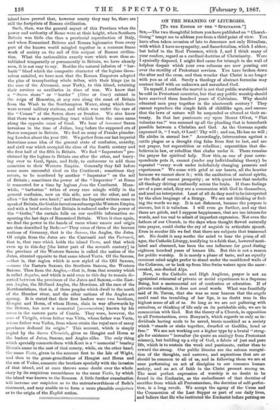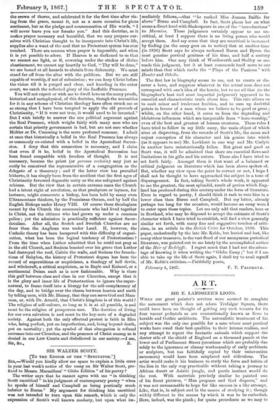ON THE MEANING OF LITURGIRS.
[To THE EDITOR OF THE "SPECTATOR."]
Snr,—The two thoughtful letters you have published on " Church- Going " tempt me to address you from a third point of view. You have often taken occasion of late to denounce not only Ritualism, with which I have no sympathy, and Sacerdotalism, which I abhor, but belief in the Real Presence, which I, and I think many of your readers, regard as a cardinal doctrine of Christianity. Were I cynically disposed, I might find cause for triumph in the wail of helpless despair which your own columns are now pouring out over the sterility of Protestant services. You have broken down the altar and the cross, and then wonder that Christ is no longer with you as of old. Surely a theology of abstract formulas may content itself with an unknown and unrealized God.
To myself, I confess the marvel is not that public.worship should be cold in Protestant countries, but that any public worship should have survived three hundred years of Calvinism. Why should educated men pray together in the nineteenth century ? They cannot reproduce the simple faith of childlike ages, and assume that the laws of nature will be suspended or altered at their en- treaty. In that last passionate cry upon Mount Olivet, "Fiat voluntas tua!" was summed up all the pleading that is henceforth possible between a Christian and God. As the German mystic expressed it, " I wait, 0 Lord ! Thy will ; and see, He has no will ; He abides in eternal law." Accordingly, intercessions against a cattle plague or a drought ring false from first to last, and are not prayer, but superstition or rebellion; superstition that dis- believes in law, or rebellion that chafes under it. These remains the prayer for spiritual help. Now this, as one of your corre- spondents puts it, cannot (under any individualizing theory) be repeated "every week under indefinitely changing pressure and experiences." We come with grief at our hearts, all the heavier because we cannot show it ; with the exaltation of animal spirits, or the flush of recent prosperity ; or with quest ions that underlie all theology driving confusedly across the brain. If these feelings are of a pure mind, they are a communion with God in themselves, and need no interpreter. Least of all do they need to be interpreted by the alien language of a liturgy. We are not thinking or feel- ing the words we say. It is not dishonest, because the purpose is sincere, but it is valueless. I will even go further, and say that there are griefs, and I suppose happinesses, that are too intense for words, and too real to admit of imperfect expression. Not even the fathers of our Church, in the days when thought flowed naturally into prayer, could clothe the cry of anguish in articulate speech. Even in secular life we feel that there are subjects that transcend art. No doubt it may soothe the mind to hear the poem of all ages, the Catholic Liturgy, testifying to a faith that, however muti- lated and obscured, has been the one influence for good during eighteen hundred years of human life. But this is not a reason for public worship. It is merely a phase of taste, and an equally reverent mind might prefer to stand under the mouldered walls of the Coliseum, or to look up from blue Swiss waters upon the snow- crested, sun-flushed Alps.
Now, to the Catholic and High Anglican, prayer is not an egotistical rehearsal of private or social experiences to a Supreme Being, but a sacramental act of confession or adoration. If of private confession, it does not need words. What was fancifully said of St. Teresa, that she was so near heaven that the angels could read the trembling of her lips, is no doubt true in the highest sense of all of us. So long as we are not paltering with ourselves, or thinking of life only on its perishable side, we are in communion with God. But the theory of a Church, in opposition to all Protestantism, even Banyan's, which regards us only as in- dividuals having souls to be saved, treats mankind as a society which "stands or sinks together, dwarfed or Godlike, bond or free." We are not working out a higher type by a brutal "strug- gle for existence" hereafter (to quote an analogy from Protestant science), but building up a city of God, a fabric of just and pure
life, which i8 to sustain the weak and passionate, .rather than to reward the strong. Our public litanies are the solemn recogni-
tion of the thoughts, and sorrows, and aspirations that are or should be common to all of us, and in following them we are at once performing an act of discipline to our common human society, and an act of faith in the Christ present among us.
The most perfect expression of worship is no doubt to be found in the Eucharist, as the embodiment of that doctrine of sacrifice from which all Protestantism, the doctrine of self-perfec- tion, is a long revolt. We accept the agony of the Cross and the Communion of the Last Supper as part of our daily lives, and believe that He who instituted the Eucharist before putting on
the crown of thorns, and celebrated it for the first time after ris- ing from the grave, meant it, not as a mere occasion for pious sentiment, but as the pledge and consummation of His words, "I -will never leave you nor forsake you." And this doctrine, as it makes prayer necessary and beautiful, that we may prepare our- selves with Christian thought to be incorporate into Christ's life, supplies also a want of the soul that no Protestant system has ever touched. There are seasons when prayer is impossible, and when it is yet possible to adore. If Heaven is so darkened to us that we cannot see light, or if, cowering under the strokes of divine chastisement, we cannot say heartily to God, "Thy will be done," we are bound at all hazards to abstain from dishonesty. We must stand far off from the altar with the publican. But we are still capable of worship, if not of submission ; we can keep Christ before the vision till it is purged and clear, and kneeling in the outer court, we catch the reflected glory of the Ineffable Presence.
You will not expect or wish me to dwell here on the many proofs, historical and metaphysical, of this doctrine, though the necessities for it in any scheme of Christian theology have often struck me as so strong that I have been tempted to apply the old proverb of Christianity, "If it were not true, it would need to be invented." But I wish briefly to answer the one political argument against the Real Presence, -which weighs fairly with many men who are certain that priestly government is bad, but are not sure whether Mohler or Dr. Cumming is the more profound reasoner. I admit at once that historically a belief in the Real Presence has always or commonly co-existed with a belief in the Apostolical Succes- sion. I deny that this connection is necessary, and I claim that even if it be, belief in the Apostolical Succession has been found compatible with freedom of thought. It is not necessary, because the priest (or persona ecclesim) may just as easily be conceived the representative of a congregation as the delegate of a theocracy ; and if the latter view has prevailed hitherto, it has simply been from the accident that the first ages of Christianity favoured dogmatic unity as the one safeguard against schisms. But the view that in certain extreme cases the Church had a latent right of revolution, so that presbyters or laymen, for instance, might consecrate a bishop, has been held by many even Dltramontane thinkers, by the Franciscan Occam, and by half the English Bishops under Henry VIII. Of course these theologians meant by the Church the communicants who had lived together in Christ, not the citizens who had grown up under a common police ; yet the admission is practically sufficient against Sacer- dotaliam. After all, the Scotch and Swedish Churches are no freer than the Anglican was under Laud. If, however, the Catholic theory has been hampered with this difficulty of organi- zation, what bas been the logical tendency of Protestantism? From the time when Luther admitted that he could not pray as in the old Church, and Socinus boasted over his grave that Luther had destroyed the roof, Calvin the walls, and Socinus the founda- tions of Babylon, the history of Protestant dogma has been the record of superstitions or scepticiams, a theology of hell devils, and witchcraft, a critical scepticism, as in Bayle and Kuinoel, or a sentimental Deism such as is now fashionable. Why is there this gulf between class and class in our Churches, except that it is the glory and inner life of Protestantism to ignore the super- natural, to frame itself into a liturgy for the self-complacency of the day, and to bridge over the chasm between heaven and earth by telling men, with Mr. Binney, that they can serve God and Mam- mon, or, with Dr. Arnold, that Christ's kingdom is of this world? The religion of self-culture, so long as it is at all possible, is and must be the religion of prosperous men. The doctrine of living for our own salvation is and must be the key-note of a degraded society. Against both the only effectual protest is faith in Him who, being perfect, put on imperfection, and, being beyond death, put on mortality ; yet the symbol of that abnegation is refused entrance into our Churches, and the presence of Christ among us is denied in our Law Courts and disbelieved in our society.—I am,































 Previous page
Previous page